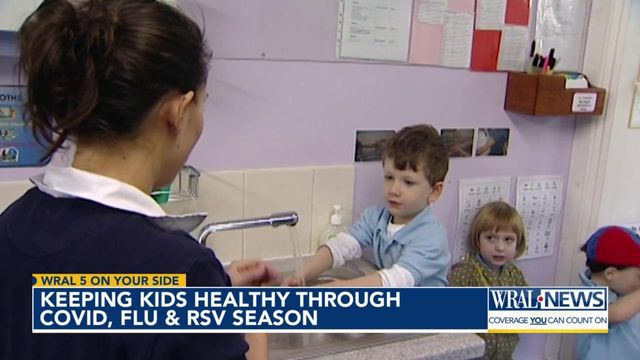Steps you can take to prevent your child from getting sick, and what to do if they do
Historically in North Carolina, February and March are when the state sees the greatest number of flu deaths.
Parents and children battle a triple threat of viruses during the winter: flu, RSV and COVID-19.
There are some things you can do to help prevent your child from getting sick, and ways to help them if they do.
How to prevent your child from getting sick
Keeping kids healthy comes down to the basics.
To start, children should be properly washing their hands. Doctors recommend scrubbing for 20 seconds, or the time it takes to sing “Happy Birthday,” when they get home, after using the bathroom and before eating.
In addition to frequent hand-washing, parents should disinfect high-touch surfaces, including doorknobs, toys and cellphones.
There are also several preventative actions you can take to avoid the flu, according to the Center for Disease Control:
- Avoid close contact with people who are sick.
- If you are sick, limit contact with others as much as possible to keep from infecting them.
- Cover coughs and sneezes: Cover your nose and mouth with a tissue when you cough or sneeze. Throw the tissue in the trash after you use it.
- Avoid touching your eyes, nose and mouth. Germs spread this way.
- Clean and disinfect surfaces and objects that may be contaminated with viruses that cause flu.
For the flu, the CDC recommends that people stay home for at least 24 hours after their fever is gone except to get medical care or other necessities. Fever should be gone without the need to use a fever-reducing medicine. Note that the stay-at-home guidance for COVID-19 may be different.
Keep in mind, however, it's not guaranteed to prevent illness.
“While there’s no magic way to keep your kids from ever getting sick, there are some things you can do to better your odds, like keeping your kid’s vaccinations up to date,” Loria added.
What to do if your child gets sick
If your child does end up getting sick, focus on making them as comfortable as possible.
“Kids generally need time to get better,” Loria said. “So let your child rest, watch some movies, perhaps, and, importantly, keep them hydrated.”
Remember when your family made you eat chicken noodle soup to feel better? Turns out there’s something to that.
Research suggests that chicken soup may give you relief from your cold symptoms, such as sore throat, and can help with dehydration prevention.
Monitor your child's symptoms as well. Children with a cold are at risk for secondary infections, including ear infections, lung infections and, in the case of older children, sinusitis.
When you should take your child to a doctor
Most cold symptoms resolve themselves in a week. A visit to the doctor usually isn’t necessary, but UNC Health pediatrician Priyanka Rao says parents shouldn’t hesitate to contact their child’s pediatrician if they’re concerned.
“You know your child best, so if you’re worried, give us a call,” she says. “We can provide advice over the phone or determine if you should come in.”
There are some symptoms that should warrant a doctor's visit:
- Any trouble breathing, including hard or rapid breathing, an inability to catch their breath or unusual noises during coughing
- A fever that lasts longer than three days
- Not drinking much; not using the bathroom or producing a wet diaper every six to eight hours
As for flu, The Mayo Clinic suggests the following are symptoms that should be checked by a doctor:
- Fever of 100.4 degrees in newborns up to 12 weeks.
- Rising fever or fever lasting more than two days in a child of any age
- Trouble with breathing or wheezing
- Ear pain
- Fussiness or drowsiness that isn't typical
- No interest in eating
What medications should your child take if they have a cold, flu or RSV?
As for medication, it’s best to check with your doctor, but using children’s ibuprofen or acetaminophen (Tylenol) is usually okay.
For a stuffy nose, use saline drops or spray. A humidifier in your child’s bedroom will help to thin out mucus while sleeping. You can also put on a hot shower and let the child play in a steamy bathroom, which helps to break up snot and mucus.
If your child is old enough, help them to blow their nose. For small kids, you may have to use a bulb syringe or a nasal aspirator to remove mucus.
For cough, try giving a child older than 12 months a teaspoon of honey. Kids older than 6 can use cough or throat drops.
Steer clear of cough medicine, however. The active ingredient meant to ease your child’s cough does not work well on them and can be dangerous in some cases.
If your child develops a secondary infection from a cold, it may require antibiotics prescribed by a doctor.
When should you take your child to the ER?
Never ignore the warning signs of an emergency.
If your child has a fever higher than 105 degrees, shows signs of dehydration or is having trouble breathing, take them to the emergency room.
As for newborns, any child under two months with a fever should be taken to the ER.














